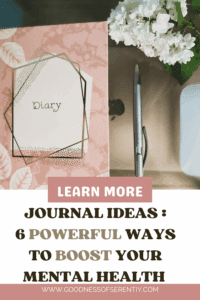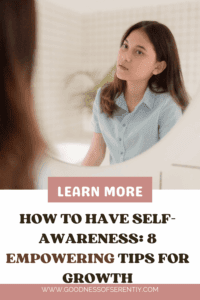Last updated on January 20th, 2026 at 11:18 am
This post may contain affiliate links at no extra cost to you. Thank you for your support! Find out more in the affiliate disclosure.
To cultivate more peace, being mindful is essential. Simple mindfulness exercises for beginners can help you slow down and reconnect with yourself.
Well, here’s a gentle guide for a mindful lifestyle to boost your self-care journey.
Furthermore, it’s ideal if you’re exploring mindful living and seeking practical mindful tips that work.
Ready to dive in? Let’s go!
😊PS: Get your free downloadable self-care checklist below this post to start listing your mindfulness goals!
What is Mindfulness?
A study defined mindfulness as a process of having an acceptance to the present moment. Additionally, it involves being in the present without criticism.
Mindfulness exercises for beginners might not sound like something to use to get well quickly.
Oh, but friends, mindfulness is just the right tool you need to enhance peace in your life and amplify your self-care journey, too.
📌PS: Save this pin. You’ll thank yourself later!
How Mindfulness Exercises Are Important for Your Mind
Mindfulness is heavily rooted in being present with your thoughts without needing to change anything.
It’s a simple way to be with your mind.
Furthermore, mindfulness activities and healthy coping skills begin with simple present moments.
Let’s see how mindfulness is good for your mental well-being and to support overall mind-body health.
How Does Learning Mindful Exercises Benefit Your Mental Health?
Mindfulness is not only supposed to encourage you to be present, but it also creates a calming environment for your mental health.
How so?
Well, according to a study published, mindfulness is a great tool to enhance mental well-being. Additionally, the results of the study found that mindfulness is effective in reducing stress levels and rumination.
These benefits are the reason why you can use mindfulness as a tool to restart your life or to build a positive mindset.
Also, mindfulness became the perfect ground to help reduce symptoms of depression, leading to more behavioral regulation.
For anyone starting mindfulness habits, this foundation is essential.
How Does Learning to Be More Mindful Help with Thoughts?
When it comes to mindfulness, your mind and thoughts are key players.
From my experience, I notice that without exercising some mind awareness, my thoughts typically run wild in my mind.
Developing mind-awareness slowly rewires how you respond.
Also, let me tell you that the aftermath isn’t great because I’m more prone to overthinking.
So, mindfulness helps not only to be as present as possible but also to help unjumble my thoughts and get some clarity.
However, mind health improves when you learn how to be mindful in your daily life.
Why Are Mindfulness Activities Important?
Mindfulness acts like a tool we need to be in tune with ourselves.
As simple as it may sound, learning how to be mindful is a simple and yet powerful way to connect to what is happening internally.
Most mindfulness exercises for beginners start with simple practices like breathing or gratitude.
Additionally, learning mindful self-improvement can give you that space you need to just take time out and connect to yourself on a different level.
How Do Mindfulness Exercises for Beginners Help with Emotions?
Mindfulness is a simplified way of connecting with our emotions. Mindfulness gives space to unlock what potentially could be troubling you.
Mindful living helps you build healthy coping skills and emotional awareness.
Additionally, mindfulness paves the way to the road of peace you may be seeking.
So, if peace is what you’re prioritizing, learning how to be more mindful is just what you need.
In this way, you’ll be able to clear that fog that has been clouding your mind.
Bearing that in mind, let’s dive into 7 tips to help you master how to be more mindful in your life.
7 Sweet Tips to Master Mindfulness Exercises for Beginners
Here are 7 tips on how to help you experience the benefits of mindfulness and take your self-care journey to a whole new level.
Also, these are simple mindfulness tips for beginners and can fit into any mindful lifestyle or your morning mindfulness aesthetic.
These will help you cultivate mindful life habits that support long-term wellness.
1. Be Present with Your Mind
Before seeing the fruits of mindfulness, it’s important to find a quiet space for yourself.
Being away from noise will help you find solace to connect to what thoughts have been taking up your space lately.
Once quiet, consider closing your eyes and identifying what’s happening. Is your mind racing because of work responsibilities?
Or has a recent life change left you mentally restless? Additionally, consider writing everything on a piece of paper if possible.
This beginner-friendly mindfulness tip is great if you’re building a mindful woman aesthetic or mindful body awareness.
2. Implement Object-Focused Mindfulness
After being aware of what’s happening in your mind, it’s time to start shifting your focus. To take things up a notch, consider implementing the following technique.
This includes using a specific object to focus on. For example, if you have a flower garden, that could be your sanctuary to exercise mindfulness.
Perhaps before taking deep breaths, take a moment to look at your chosen object.
PS, make sure that your chosen object is something that soothes you, whether it’s a painting or just looking at the sky.
Reed diffusers or scented candles can work well by providing some aromatherapy as well.
3. Connect To Your Breath
Typically, when we are experiencing anxiety, our breathing is usually irregular. It may be easy to run to other solutions, like medication, to help.
A study focused on participants who were struggling with breathing and anxiety.
So, the researchers introduced a 20-minute breathing technique for these participants who were facing a health issue. The results showed that deep breathing led to more mindfulness.
You could start by doing 3 deep breaths, even for just 2 minutes.
Breathwork is one of the easiest exercises for beginners to relax and reset. Feel free to check out my post below about how to master deep breathing exercises in your quiet space.
4. Exercise Some Self-Awareness
This step is about self-motivation. It involves you being connected to what’s happening on the inside.
You will connect to a disciplined way of thinking instead of being double-minded.
Furthermore, you’ll be honest about what’s been weighing on you mentally. Could it be a productive day routine that gives you stress?
Or could it be the goal aspirations that are leaving you overwhelmed?
You need to be honest about what’s happening in your mind to create a space for a mindful life.
Simpler interventions, like mindfulness, can be just as or even more effective than complex coping strategies people often try.
5. Add a Journal to Your Mindfulness Journey
Once you’ve gathered what’s happening, you might want to consider pouring your thoughts into your journal.
It will give you space to express your thoughts on something physical that you can also refer to. After all, journaling has amazing benefits for mental health.
Using a guided journal supports self-improvement and self-motivation, especially when paired with mindfulness activities.
Journaling has worked wonders for my mental health as it has become a safe space to process my thoughts.
So, if you’re curious, check out my post further below this post about the benefits of journaling for mental health.
6. Embrace Your Thoughts
Thoughts that are all over the place can sometimes worm their way out into how we talk and act.
To protect your mental health, it’s important to accept your thoughts before giving them your attention instead of discarding them quickly.
Also, this is a simple but effective way to learn how to better yourself.
For me, this step has taught me to stop condemning myself for being human but to be kind to myself.
Do you ever have moments when you say something randomly and wonder, “Did I just think that?” So yes, the things you think can be a big deal.
7. Remember To Speak Mindfully to Yourself
It’s important to be aware of how you speak to yourself during this process. And yes, it doesn’t have to be that difficult.
It can be as simple as instead of saying, “I can’t do this anymore,” to something like “I am trying to be more mindful and kinder to myself. That’s all that matters.”
Your pep talk to yourself can easily make or break your progress.
I know it can be hard, but just try your best, okay?
🌼If you enjoyed this, you might also like these related posts:
Conclusion
Learning mindfulness exercises for beginners can be a beautiful experience because of its many benefits.
It’s great for many things, from enhancing your mental health to helping you dissect your thoughts more effectively.
I hope that with these tips, you feel more comfortable starting your journey to learning how to practice mindfulness daily.
As you build a mindful life and work towards your dream life, remember that these small habits add up.
So now I want to hear from you.
Which tip resonated with you to encourage you to help implement mindfulness? Share in the comments below.
If you found this post helpful, please share it on social media.
Don’t forget to follow my social media pages.
Until next time, please take care.



